-
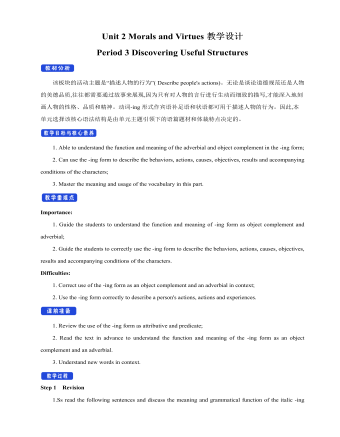
新人教版高中英语必修3Unit 2 Morals and Virtues教学设计三
The joke set her crying.这个玩笑使她哭起来。Step 5 ReadingActivity 31. Students read the small text in activity 3. The teacher provides several small questions to check whether students understand the content of the text and the ideographic function of the -ing form in the text.*Where are those people?*Why did Dr Bethune come to China?*How did he help the Chinese people during the war?*What did Chairman Mao Zedong say about him?2. Ss try to rewrite some sentences using the -ing form. Then check the answers. When checking the answers, the teacher can ask different students to read the rewritten sentences and give comments.Answers:1. he became very interested in medicine, deciding to become a doctor.2. …after hearing that many people were dying in the war.3. Helping to organise hospitals, he taught doctors and nurses, and showed people how to give first aid./ He helped to organise hospitals, teaching doctors and nurses, and showing people how to give first aid.4. …praising Dr Bethune as a hero to be remembered in China.Step 6 PracticeActivity 4Students complete grammar activities 2 and 3 on page 69 of the workbook.Step 6 Homework1. Understand and master the functions and usage of the -ing form;2. Finish the other exercises in Using structures.1、通过本节内容学习,学生是否理解和掌握动词-ing形式作宾语补足语语和状语语的功能和意义;2、通过本节内容学习,学生能否正确使用动词-ing形式描述人物的行为、动作及其经历;3、通过本节内容学习,学生能否独立完成练习册和导学案中的相关练习。
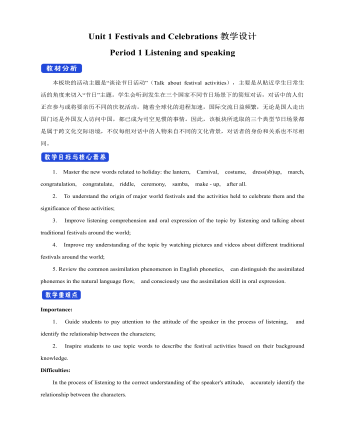
新人教版高中英语必修3Unit 1 Festivals and Celebrations教学设计一
本板块的活动主题是“谈论节日活动”(Talk about festival activities),主要是从贴近学生日常生活的角度来切入“节日”主题。学生会听到发生在三个国家不同节日场景下的简短对话,对话中的人们正在参与或将要亲历不同的庆祝活动。随着全球化的进程加速,国际交流日益频繁,无论是国人走出国门还是外国友人访问中国,都已成为司空见惯的事情。因此,该板块所选取的三个典型节日场景都是属于跨文化交际语境,不仅每组对话中的人物来自不同的文化背景,对话者的身份和关系也不尽相同。1. Master the new words related to holiday: the lantern, Carnival, costume, dress(sb)up, march, congratulation, congratulate, riddle, ceremony, samba, make - up, after all. 2. To understand the origin of major world festivals and the activities held to celebrate them and the significance of these activities;3. Improve listening comprehension and oral expression of the topic by listening and talking about traditional festivals around the world;4. Improve my understanding of the topic by watching pictures and videos about different traditional festivals around the world;5. Review the common assimilation phenomenon in English phonetics, can distinguish the assimilated phonemes in the natural language flow, and consciously use the assimilation skill in oral expression. Importance:1. Guide students to pay attention to the attitude of the speaker in the process of listening, and identify the relationship between the characters;2. Inspire students to use topic words to describe the festival activities based on their background knowledge. Difficulties:In the process of listening to the correct understanding of the speaker's attitude, accurately identify the relationship between the characters.
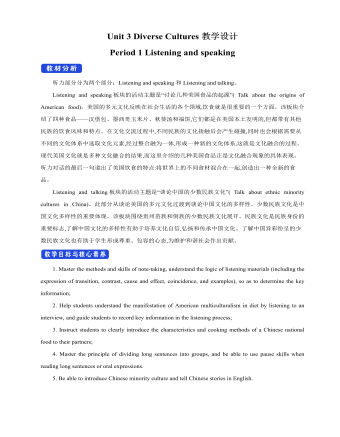
新人教版高中英语必修3Unit 3 Diverse Cultures教学设计一
Activity 81.Grasp the main idea of the listening.Listen to the tape and answer the following questions:Who are the two speakers in the listening? What is their relationship?What is the main idea of the first part of the listening? How about the second part?2.Complete the passage.Ask the students to quickly review the summaries of the two listening materials in activity 2. Then play the recording for the second time.Ask them to complete the passage and fill in the blanks.3.Play the recording again and ask the students to use the structure diagram to comb the information structure in the listening.(While listening, take notes. Capture key information quickly and accurately.)Step 8 Talking Activity 91.Focus on the listening text.Listen to the students and listen to the tape. Let them understand the attitudes of Wu Yue and Justin in the conversation.How does Wu Yue feel about Chinese minority cultures?What does Justin think of the Miao and Dong cultures?How do you know that?2.learn functional items that express concerns.Ask students to focus on the expressions listed in activity. 3.And try to analyze the meaning they convey, including praise (Super!).Agree (Exactly!)"(You're kidding.!)Tell me more about it. Tell me more about it.For example, "Yeah Sure." "Definitely!" "Certainly!" "No kidding!" "No wonder!" and so on.4.Ask the students to have conversations in small groups, acting as Jsim and his friends.Justin shares his travels in Guizhou with friends and his thoughts;Justin's friends should give appropriate feedback, express their interest in relevant information, and ask for information when necessary.In order to enrich the dialogue, teachers can expand and supplement the introduction of Miao, dong, Lusheng and Dong Dage.After the group practice, the teacher can choose several groups of students to show, and let the rest of the students listen carefully, after listening to the best performance of the group, and give at least two reasons.
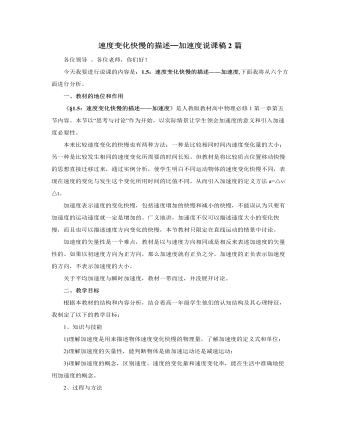
人教版新课标高中物理必修1速度变化快慢的描述─加速度说课稿2篇
本来比较速度变化的快慢也有两种方法:一种是比较相同时间内速度变化量的大小;另一种是比较发生相同的速度变化所需要的时间长短。但教材是将比较质点位置移动快慢的思想直接迁移过来,通过实例分析,使学生明白不同运动物体的速度变化快慢不同,表现在速度的变化与发生这个变化所用时间的比值不同,从而引入加速度的定义方法a=△v/△t。加速度表示速度的变化快慢,包括速度增加的快慢和减小的快慢,不能误认为只要有加速度的运动速度就一定是增加的。广义地讲,加速度不仅可以描述速度大小的变化快慢,而且也可以描述速度方向变化的快慢,本节教材只限定在直线运动的情景中讨论。加速度的矢量性是一个难点,教材是以与速度方向相同或是相反来表述加速度的矢量性的。如果以初速度方向为正方向,那么加速度就有正负之分,加速度的正负表示加速度的方向,不表示加速度的大小。
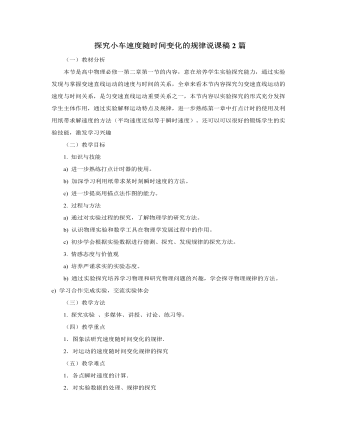
人教版新课标高中物理必修1探究小车速度随时间变化的规律说课稿2篇
(三)合作交流能力提升教师:刚才我们通过实验了解了小车的速度是怎样随时间变化的,但实验中有一定的误差,请同学们讨论并说出可能存在哪些误差,造成误差的原因是什么?(每个实验小组的同学之间进行热烈的讨论)学生:测量出现误差。因为点间距离太小,测量长度时容易产生误差。教师:如何减小这个误差呢?学生:如果测量较长的距离,误差应该小一些。教师:应该采取什么办法?学生:应该取几个点之间的距离作为一个测量长度。教师:好,这就是常用的取“计数点”的方法。我们应该在纸带上每隔几个计时点取作一个计数点,进行编号。分别标为:0、1、2、3……,测各计数点到“0”的距离。以减小测量误差。教师:还有补充吗?学生1:我在坐标系中描点画的图象只集中在坐标原定附近,两条图象没有明显的分开。学生2:描出的几个点不严格的分布在一条直线上,还能画直线吗?
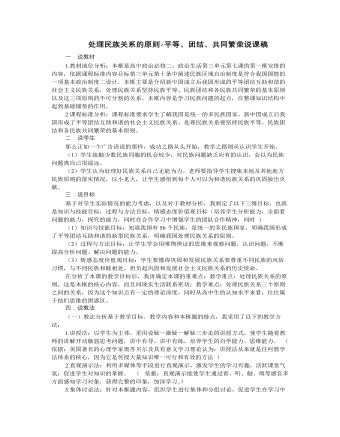
人教版高中政治必修2处理民族关系的原则-平等、团结、共同繁荣说课稿
环节四 情感升华,感悟生活播放《爱我中华》,感受祖国的伟大,民族的团结。设计意图:使学生感受伟大的中华民族的精神,内心产生共鸣,抒发强烈的爱国热情。教师带领学生一起合唱,用歌声结束本堂课内容,能再次唤起学生的爱国情感,使学生认识到:维护国家统一和民族团结是每个公民的义务。环节五 课堂小结 巩固知识本节课我采用线索性的板书,整个知识结构一目了然,为了充分发挥学生在课堂的主体地位,我将课堂小结交由学生完成,请学生根据课堂学习的内容,结合我的板书设计来进行小结,以此来帮助教师在第一时间掌握学生学习信息的反馈,同时培养学生归纳分析能力、概括能力。本节课,我根据建构主义理论,强调学生是学习的中心,学生是知识意义的主动建构者,是信息加工的主体,要强调学生在课堂中的参与性、以及探究性,不仅让他们懂得知识,更让他们相信知识,并且将知识融入到实践当中去,最终达到知、情、意、行的统一。
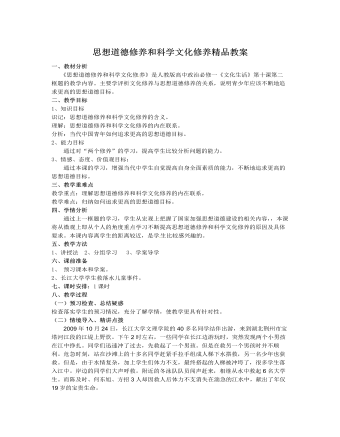
人教版高中政治必修3思想道德修养和科学文化修养精品教案
一、教材分析《思想道德修养和科学文化修 养》是人教版高中政治必修一《文化生活》第十课第二框题的教学内容。主要学评析文化修养与思想道德修养的关系,说明青少年应该不断地追求更高的思想道德目标。二、教学目标1、知识目标识记:思想道德修养和科学文化修养的含义。理解:思想道德修养和科学文化修养的内在联系。分析:当代中国青年如何追求更高的思想道德目标。2、能力目标通过对“两个修养”的学习,提高学生比较分析问题的能力。3、情感、态度、价值观目标:通过本课的学习,增强当代中学生自觉提高自身全面素质的能力,不断地追求更高的思想道德目标。三、教学重难点教学重点:理解思想道德修养和科学文化修养的内在联系。教学难点:归纳如何追求更高的思想道德目标。四、学情分析通过上一框题的学习,学生从宏观上把握了国家加强思想道德建设的相关内容,,本课将从微观上即从个人的角度重点学习不断提高思想道德修养和科学文化修养的原因及具体要求。本课内容离学生的距离较近,是学 生比较感兴趣的。
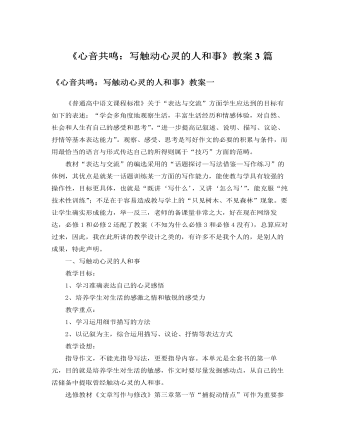
人教版高中语文必修1《心音共鸣:写触动心灵的人和事》教案3篇
《普通高中语文课程标准》关于“表达与交流”方面学生应达到的目标有如下的表述:“学会多角度地观察生活,丰富生活经历和情感体验,对自然、社会和人生有自己的感受和思考”,“进一步提高记叙述、说明、描写、议论、抒情等基本表达能力”。观察、感受、思考是写好作文的必要的积累与条件,而用最恰当的语言与形式传达自己的所得则属于“技巧”方面的范畴。教材“表达与交流”的编选采用的“话题探讨—写法借鉴—写作练习”的体例,其优点是就某一话题训练某一方面的写作能力,能使教与学具有较强的操作性,目标更具体,也就是“既讲‘写什么’,又讲‘怎么写’”,能克服“纯技术性训练”;不足在于容易造成教与学上的“只见树木、不见森林”现象。要让学生确实形成能力,举一反三,老师的备课量非常之大,好在现在网络发达,必修1和必修2还配了教案(不知为什么必修3和必修4没有),总算应对过来,因此,我在此所讲的教学设计之类的,有许多不是我个人的,是别人的成果,特此声明。
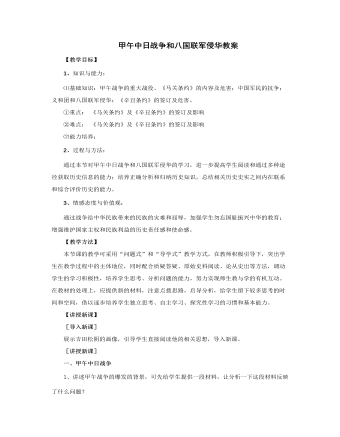
人教版高中历史必修1甲午中日战争和八国联军侵华教案
(1)巨额的赔款,是列强对中国空前的大规模勒索;为支付这笔巨额赔款,清政府加紧搜刮人民,使人民生活更加贫困,社会经济更加凋敝。(2)在北京设立的“使馆界”,实际上是“国中之国”,是帝国主义策划侵略中国的大本营。外国侵略者控制京津地区,使清政府完全处于外国军队的控制之下,便于侵略者直接派兵镇压中国人民的反帝斗争。(3)按照条约规定,清朝官吏严厉镇压中国人民的反帝斗争,进一步成为帝国主义的帮凶。(4)改设外务部的规定,便于清政府能够按照外国侵略者的意旨实行卖国的外交政策。《辛丑条约》是帝国主义强加给中国的一个严重的不平等条约,列强除了穷凶极恶地对中国敲诈勒索外,还重新确立了以慈禧太后为首的清政府继续充当它们在华的代理人。
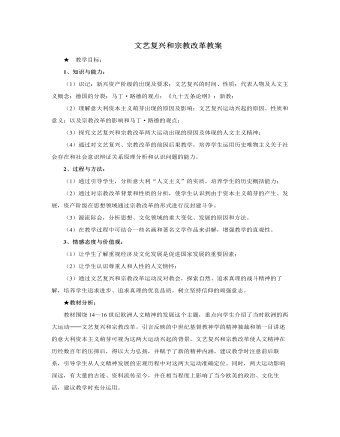
人教版高中历史必修3文艺复兴和宗教改革教案
三、宗教改革:1、背景:(1)文艺复兴的影响。文艺复兴中,人文主义学者尽管对宗教保持较为温和的态度,但其以人为中心的思想极大地冲击了天主教的精神独裁,天主教的权威日益受到人们的怀疑。(2)天主教会对欧洲尤其是德意志的压榨。中世纪的天主教会对人民进行严密的精神统治,基督教信仰的核心是“原罪”和“灵魂救赎”,即人生下来就有罪,只有信仰上帝,跟随耶稣才能得救。就“灵魂救赎”而言,最初强调的是个人信仰的作用,后来,神学家们又加上了种种繁杂的宗教礼仪,而且必须得到神职人员的帮助,灵魂才能得救。在经济上,天主教会还是最大的封建主,占有大量的土地,并征收什一税,对各国人民大肆搜刮。罗马教廷每年从德意志搜刮的财富达30万古尔登(货币单位),相当于“神圣罗马帝国”皇帝每年税收额的20倍。德意志也成了被教会榨取最严重的地区,素有“教皇的乳牛”之称。
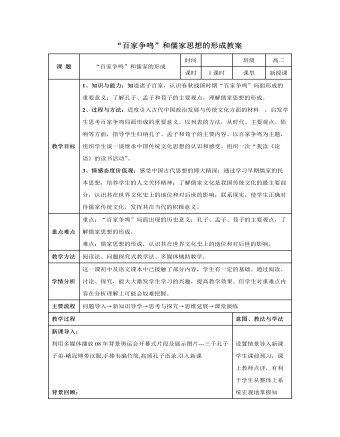
人教版高中历史必修3“百家争鸣”和儒家思想的形成教案
1、知识与能力:知道诸子百家,认识春秋战国时期“百家争鸣”局面形成的重要意义;了解孔子、孟子和荀子的主要观点,理解儒家思想的形成。2、过程与方法:适度引入古代中国政治发展与传统文化方面的材料 ,启发学生思考百家争鸣局面形成的重要意义。以列表的方法,从时代、主要观点、影响等方面,指导学生归纳孔子、孟子和荀子的主要内容。以百家争鸣为主题,组织学生谈一谈继承中国传统文化思想的认识和感受。组织一次“我读《论语》的读书活动”。3、情感态度价值观:感受中国古代思想的博大精深:通过学习早期儒家的民本思想,培养学生的人文关怀精神;了解儒家文化是我国传统文化的最主要部分,认识其在世界文化史上的地位和对后世的影响;联系现实,使学生正确对待儒家传统文化,发挥其在当代的积极意义。
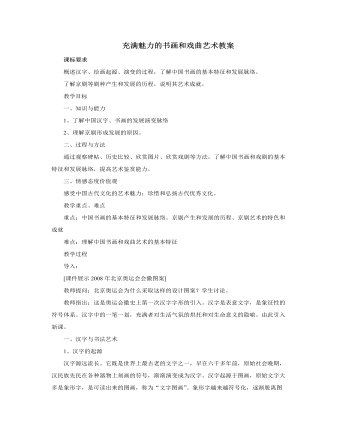
人教版高中历史必修3充满魅力的书画和戏曲艺术教案
乾隆五十五年(公元1790年),在安徽一带很有名气的“三庆”徽戏班,来到北京演出。徽戏在北京经常和其他剧种同台演出,注意吸收和借鉴他们的长处。尤其是与以唱二黄调和西皮调为主的汉戏的合演,逐渐形成了二黄与西皮的合流,形成了“徽汉合流”的局面,后来徽剧又吸收其他民间曲调的唱腔、剧目和表演方式,逐渐形成以“皮黄”为主要声腔的京剧。到1840年左右,京剧的唱腔、念白、剧本和表演已经成熟,尤其是出现了以演“京戏”为主的一批演员,他们不再以徽戏、汉戏为名,而以演“京戏”自居。从此,诞生了一个独立的剧种──京剧。2、京剧的发展早期的京剧以迷人的唱腔、丰富的剧目、精彩的表演和京腔京味吸引了观众,使京城出现了京剧热。同治、光绪年间,京剧已经被京城市民承认,成为人们最喜爱的舞台艺术。并涌现出著名的“同光十三绝”。
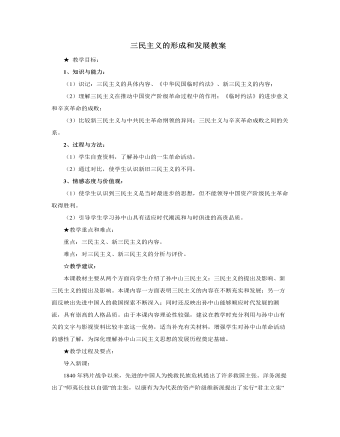
人教版高中历史必修3三民主义的形成和发展教案
局限性:新三民主义在理论上、纲领上仍然没有超出资产阶级民主主义的范畴。且与中共民主革命纲领有着原则的区别。与中共革命纲领相比,新三民主义缺少的内容:八小时工作制、彻底实现人民的权利、社会主义。教学小结:(以问题代小结)(1)本课内容涉及孙中山先生一生两次重要的转变。你知道是哪两次吗?在学生讨论的基础上,教师总结:孙中山先生一生有两次重要的转变,第一次是放弃改良而走向革命道路;第二次是在他领导的一系列资产阶级革命活动失败后,接受苏俄和中共的帮助,把旧三民主义发展成为新三民主义,实行“联俄、联共、扶助农工”三大政策,实现了他一生中最伟大的转变。(2)孙中山先生的这两次转变说明了什么?这一问题可以让学生各抒己见,但教师总结时一定要紧扣孙中山先生与时俱进,为民族革命贡献毕生精力的高贵品质。
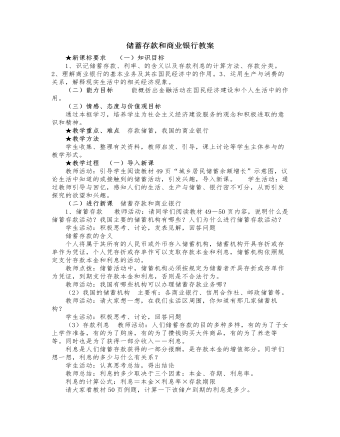
人教版高中政治必修1储蓄存款和商业银行教案
第三、结算业务结算业务时商业银行为社会经济活动中的货币收支提供手段与工具的服务。银行从中收取一定的服务费用。除上述三大业务外,商业银行还可以提供债券买卖与兑付、代理买卖外汇、代理保险、提供保管箱等其他服务。教师活动:商业银行在我国经济建设中具有巨大作用。请同学们看教材52页专家点评。学生活动:阅读课本,认真总结,得出结论(三)课堂总结、点评 这节课我们重点学习了储蓄存款和商业银行的有关知识,知道了储蓄存款活动程序、主要机构、特点和利息的计算等常识,了解了各种商业银行主要业务及其作用。这对于我们在日常生活中正确地办理金融储蓄业务将有重大指导作用。★课余作业 组织学生到附近银行、企业、居民中,咨询银行信贷活动的程序及原则要求,并亲自到商业银行办理一次存款和取款活动。
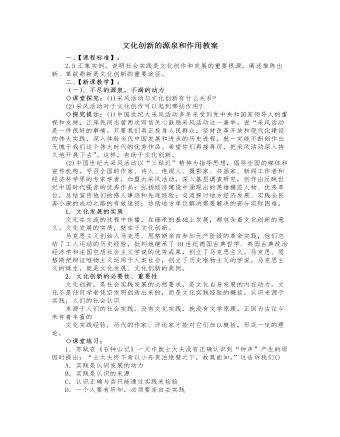
人教版高中政治必修3文化创新的源泉和作用教案
(1)社会实践是文化创新的源泉实践,作为人们改造客观世界的活动,是一种有目的、有意识的社会性活动。人类在改造自然和社会的实践中,创造出自己特有的文化。离开了社会实践;文化就会成为无源之水、无本之木,人们不可能从事任何有价值的文化创造。◇本课小结:1.关于本课逻辑结构的宏观把握:文化创新的源泉和作用这一问题,教材分三个层次展开论证:一是不尽的源泉,不竭的动力;二是巨大的作用,深刻的意义;三是呼唤文化创新的时代。教材运用辩证方法从文化创新的源泉和作用展开论述。即社会实践是文化创新的源泉,文化创新又推动社会实践的发展和促进民族文化的繁荣。教材关于文化创新的途径问题,从三个层次展开讲述:第一个层次是“继承传统,推陈出新”;第二个层次是“面向世界,博采众长”;第三个层次是“坚持正确方向,克服错误倾向”。三个层次三个角度,着重于分析每一个层次,然后予以归纳总结,即采用了分析归纳法,层次清晰,教学目标明确,既便于传授知识,又便于学生学习时识记、理解和把握。
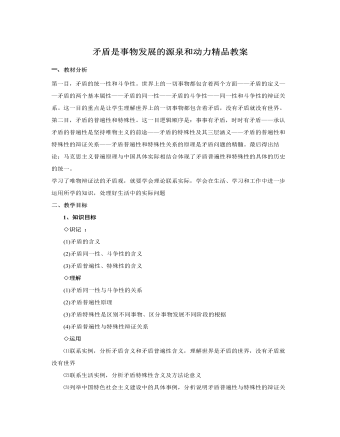
人教版高中政治必修4矛盾是事物发展的源泉和动力精品教案
一、教材分析第一目,矛盾的统一性和斗争性。世界上的一切事物都包含着两个方面——矛盾的定义——矛盾的两个基本属性——矛盾的同一性——矛盾的斗争性——同一性和斗争性的辩证关系。这一目的重点是让学生理解世界上的一切事物都包含着矛盾,没有矛盾就没有世界。第二目,矛盾的普遍性和特殊性。这一目逻辑顺序是:事事有矛盾,时时有矛盾——承认矛盾的普遍性是坚持唯物主义的前途——矛盾的特殊性及其三层涵义——矛盾的普遍性和特殊性的辩证关系——矛盾普遍性和特殊性关系的原理是矛盾问题的精髓。最后得出结论:马克思主义普遍原理与中国具体实际相结合体现了矛盾普遍性和特殊性的具体的历史的统一。学习了唯物辩证法的矛盾观,就要学会理论联系实际,学会在生活、学习和工作中进一步运用所学的知识,处理好生活中的实际问题
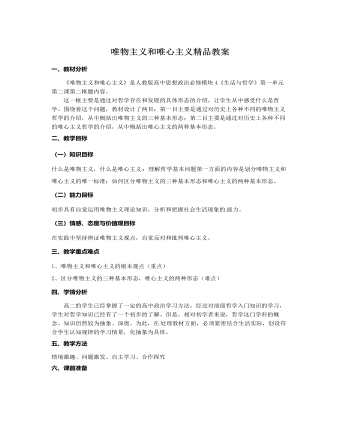
人教版高中政治必修4唯物主义和唯心主义精品教案
一、教材分析《唯物主义和唯心主义》是人教版高中思想政治必修模块4《生活与哲学》第一单元第二课第二框题内容。这一框主要是通过对哲学存在和发展的具体形态的介绍,让学生从中感受什么是哲学。围绕着这个问题,教材设计了两目:第一目主要是通过对历史上各种不同的唯物主义哲学的介绍,从中概括出唯物主义的三种基本形态;第二目主要是通过对历史上各种不同的唯心主义哲学的介绍,从中概括出唯心主义的两种基本形态。二、教学目标(一)知识目标什么是唯物主义,什么是唯心主义 ;理解哲学基本问题第一方面的内容是划分唯物主义和唯心主义的唯一标准;如何区分唯物主义的三种基本形态和唯心主义的两种基本形态。(二)能力目标初步具有自觉运用唯物主义理论知识,分析和把握社会生活现象的 能力。(三)情感、态度与价值观目标在实践中坚持辨证唯物主义观点,自觉反对和批判唯心主义。三、教学重点难点1、唯物主义和唯心主义的根本观点(重点)
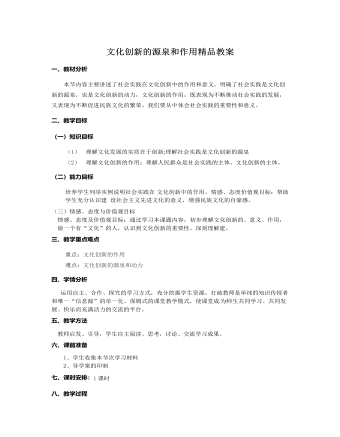
人教版高中政治必修3文化创新的源泉和作用精品教案
一、教材分析本节内容主要讲述了社会实践在文化创新中的作用和意义,明确了社会实践是文化创新的源泉,也是文化创新的动力,文化创新的作用,既表现为不断推动社会实践的发展,又表现为不断促进民族文化的繁荣。我们要从中体会社会实践的重要性和意义。二、教学目标(一)知识目标(1) 理解文化发展的实质在于创新;理解社会实践是文化创新的源泉(2) 理解文化创新的作用;理解人民群众是社会实践的主体、文化创新的主体。(二)能力目标培养学生列举实例说明社会实践在 文化创新中的作用。情感、态度价值观目标:帮助学生充分认识建 设社会主义先进文化的意义,增强民族文化的自豪感。 (三)情感、态度与价值观目标情感、态度及价值观目标:通过学习本课题内容,初步理解文化创新的、意义、作用,做一个有“文化”的人,认识到文化创新的重要性。深刻理解建。
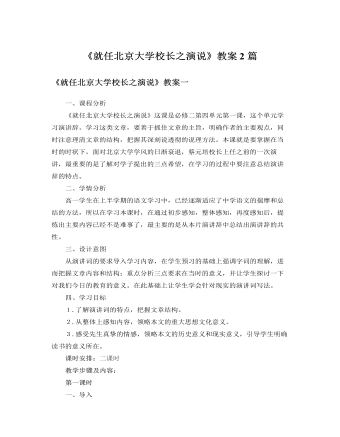
人教版高中语文必修2《就任北京大学校长之演说》教案2篇
(现状:①对于教员,不能以诚相待,礼敬有加,只是利用耳。2段:因做官心切,对于教员,则不问其学问浅深,唯问其官阶之大小。官阶大者,特别欢迎,盖唯将来毕业有人提携。②对于同学校友,不能开诚布公,道义相勖。)他的第三点要求是,要求青年学子。这是从个人涵养方面来说的。尊敬师长,团结友爱,互相勉励,共同提高,是建设良好校风必须具备的条件。端正学风,改善校风,就是为培养学术研究新风气创造条件。全校上下树立了新风尚,学校的学术气也就会很快浓起来。这也是贯彻“思想自由”的办学方针,不可或缺的措施。蔡元培先生在他这次演讲中,始终是围绕着他的办学方针来阐述的。(四)蔡先生提出两点计划,目的为何?思考、讨论、明确:一曰改良讲义,以期学有所得,能裨实用。
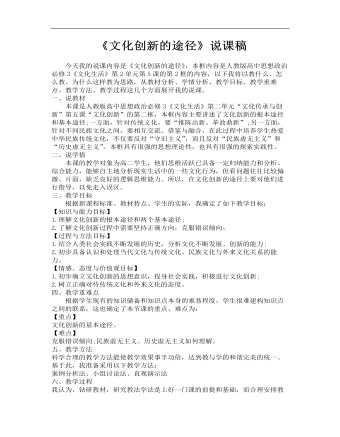
高中思想政治人教版必修三《文化创新的途径》说课稿
二、说学情本课的教学对象为高二学生,他们思维活跃已具备一定归纳能力和分析、综合能力,能够自主地分析现实生活中的一些文化行为,但看问题往往比较偏激、片面,缺乏良好的逻辑思维能力。所以,在文化创新的途径上要对他们进行指导,以免走入误区。三、教学目标根据新课程标准、教材特点、学生的实际,我确定了如下教学目标:【知识与能力目标】1.理解文化创新的根本途径和两个基本途径;2.了解文化创新过程中需要坚持正确方向,克服错误倾向。





















